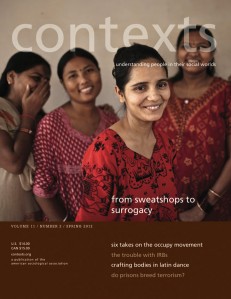
Spring 2012
Volume: 11 | Number: 2
How Rachel Carson and Michael Harrington Changed the World
The 50th anniversary of two pathbreaking books—Rachel Carson’s Silent Spring and Michael Harrington’s The Other America—that helped change public opinion and public policy about the environment and poverty is discussed. Peter Dreier looks into what contemporary academics, including sociologists, can learn from the lives and careers of these two influential public intellectuals. Read More
Dancing the Body Beautiful
Using accounts from several professional Latin dancers augmented by the author's own experience, Julia A. Ericksen traces the ways bodily perfection has become an important part of dancers’ identities. In addition, Ericksen argues that this is a more extreme form of general cultural pressure to engage in bodywork. Read More
The Real Help
Who are the help? Examining The Help and other media, the author explores the public (mis)portrayals of domestic workers. Read More
Sexualizing Girl Troubles
The issue of the sexualization of girls has made its way into scholarly and popular literature. The author discusses various media myths of hyper-sexuality in young girls and its potential problems. Read More
Surf’s Up
Sociologist Raj Andrew Ghoshal explores accommodation-sharing networks and whether they provide travelers with more than just a free place to stay. Read More
Mounting Opposition to Vivisection
Justin R. Goodman, Casey A. Borch, and Elizabeth Cherry discuss public attitudes toward animal testing and its growing opposition. Read More
Got Power?
Sociologist Christine Williams reflects on how she, as a feminist professor, advises her students to get power. Read More
Thinking in Context
The book Thinking, Fast and Slow is reviewed and shows what sociologists could learn from Daniel Kahneman's work on behavioral economics by extending this knowledge to cover the study of social interactions. Read More
Documenting Disaster After Katrina
Sociologist Gary K. Perry talks with historian Michael Mizell-Nelson about digital memory banks created after Hurricane Katrina. Perry further reflects on disasters and the pedagogy of helping. Read More
What They’re Reading
A "list" of what five sociologists and one sociologically-minded journalist are currently reading. Read More
